现代英语语法状语分类(2018年1月17日)
英语状语有哪些种类,英语状语的分类_状语从句 英语语法.doc
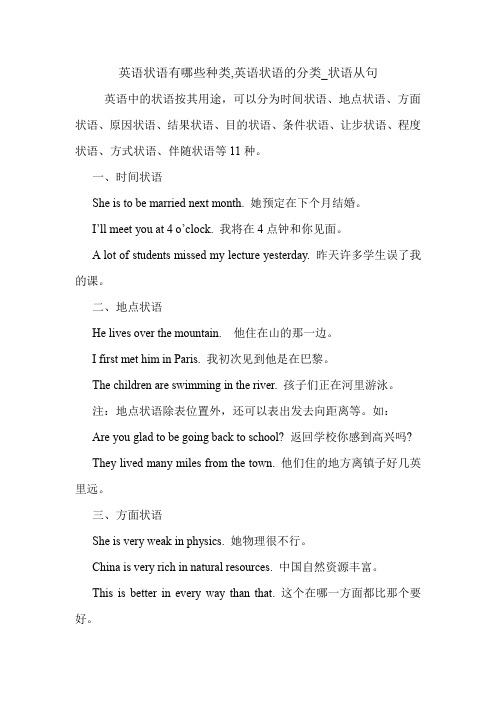
英语状语有哪些种类,英语状语的分类_状语从句英语中的状语按其用途,可以分为时间状语、地点状语、方面状语、原因状语、结果状语、目的状语、条件状语、让步状语、程度状语、方式状语、伴随状语等11种。
一、时间状语She is to be married next month. 她预定在下个月结婚。
I’ll meet you at 4 o’clock. 我将在4点钟和你见面。
A lot of students missed my lecture yesterday. 昨天许多学生误了我的课。
二、地点状语He lives over the mountain. 他住在山的那一边。
I first met him in Paris. 我初次见到他是在巴黎。
The children are swimming in the river. 孩子们正在河里游泳。
注:地点状语除表位置外,还可以表出发去向距离等。
如:Are you glad to be going back to school? 返回学校你感到高兴吗?They lived many miles from the town. 他们住的地方离镇子好几英里远。
三、方面状语She is very weak in physics. 她物理很不行。
China is very rich in natural resources. 中国自然资源丰富。
This is better in every way than that. 这个在哪一方面都比那个要好。
The bridge is 2500 meters in length and 150 meters in height. 这座桥长2500米,高150米。
四、原因状语He was surprised at what she said. 听到她说的话,他很吃惊。
He succeeded by hard work. 他由于努力工作而成功。
英语里的状语
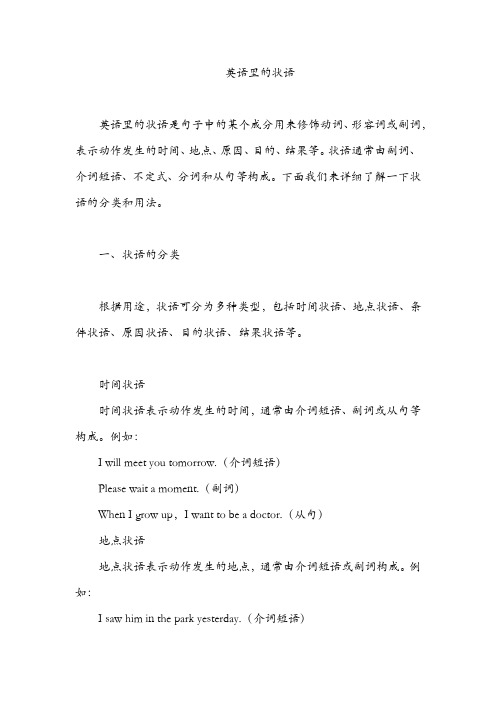
英语里的状语英语里的状语是句子中的某个成分用来修饰动词、形容词或副词,表示动作发生的时间、地点、原因、目的、结果等。
状语通常由副词、介词短语、不定式、分词和从句等构成。
下面我们来详细了解一下状语的分类和用法。
一、状语的分类根据用途,状语可分为多种类型,包括时间状语、地点状语、条件状语、原因状语、目的状语、结果状语等。
时间状语时间状语表示动作发生的时间,通常由介词短语、副词或从句等构成。
例如:I will meet you tomorrow.(介词短语)Please wait a moment.(副词)When I grow up,I want to be a doctor.(从句)地点状语地点状语表示动作发生的地点,通常由介词短语或副词构成。
例如:I saw him in the park yesterday.(介词短语)She is happy to live in a big city.(副词)条件状语条件状语表示动作发生的条件,通常由从句或介词短语构成。
例如:If it rains,we will stay at home.(从句)The offer is valid for 30 days.(介词短语)原因状语原因状语表示动作发生的原因,通常由介词短语或从句等构成。
例如:She is sad because her friend is leaving.(介词短语)The plane was delayed due to bad weather.(介词短语)He cried because he was happy.(从句)目的状语目的状语表示动作发生的目的,通常由介词短语或不定式构成。
例如:She studied hard to get a good grade.(不定式)They traveled to Europe for vacation.(介词短语)结果状语结果状语表示动作发生的结果,通常由副词、介词短语或从句等构成。
同位语、表语、宾语、定语,状语从句分类概要
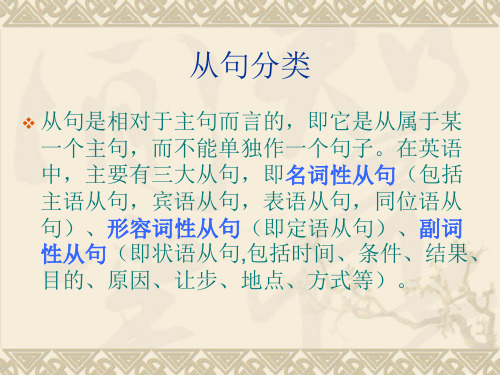
❖ Since /As the weather is so bad, we have to delay our journey. 天气那么 糟,旅行就推迟了。 (原因状语从句,常用 because, since, as, for fear ( 恐怕 ), seeing that ( 既然 ) , now that (=since), considering that ( 考虑 到 ) 等引导。)
3.由连接副词when, where, how, why引导的主语从句
When he will be back depends on the weather. Where we shall hold the meeting will be discussed at today’s meeting. Why he didn't come here is not clear to anyone.
❖ You must speak louder so that /in order that you can be heard by all. 你必须大声说话,才能让所有人听到你说话。 (目的状语,可以由that, so that, in order that, lest, for fear that, in case等词引导。)
回答问题的学生)
副词性从句(即状语从句,包括时间、 条件、结果、目的、原因、让步、
地点、方式等)
❖ 状语从句相当于一个副词,如:
When it rains, I usually go to school by bus. 天下雨时,我通常坐公共汽车上学。(时间 状语)
❖ If he comes tomorrow, you will see him. 如果他明天来,你就 可以看见他。(if 引导的条件状语从句,其结构为:if +状语从 句,+主句)。要注意在状语从句中有一个规则是“主将从 现”,即主句是将来时,则从句要用一般现在时表示将来。
状语在英语中有哪些不同的类型?

状语在英语中有哪些不同的类型?状语是用来修饰动词、形容词、副词或整个句子的词、短语或从句。
在英语中,有多种不同类型的状语,它们在表达方式和功能上有所不同。
以下是常见的几种类型:1. 时间状语:表示动作或状态发生的时间。
例如:yesterday(昨天)、in the morning(早上)等。
2. 地点状语:表示动作或状态发生的地点。
例如:at home(在家)、in the park(在公园)等。
3. 方式状语:表示动作或状态发生的方式或方式的特点。
例如:quickly(快速地)、carefully(小心地)等。
4. 原因状语:表示动作或状态发生的原因。
例如:because of (由于)、due to (由于)等。
5. 目的状语:表示动作或状态发生的目的。
例如:in order to (为了)、so as to (为了)等。
6. 结果状语:表示动作或状态发生的结果。
例如:so(因此)、thus(因此)等。
7. 条件状语:表示动作或状态发生的条件。
例如:if(如果)、unless(除非)等。
8. 伴随状语:表示动作或状态发生时的伴随情况。
例如:with (和)、along with (和)等。
9. 比较状语:表示动作或状态相对于其他事物的比较程度。
例如:more than (比…更)、less than (比…更少)等。
10. 程度状语:表示动作或状态发生的程度。
例如:very(非常)、quite(相当)等。
这些不同类型的状语可以用来丰富句子,使其更加清晰和生动。
在运用状语时,需要注意其位置和使用方式,以确保表达准确和上下文连贯。
高中英语知识点归纳状语的分类及常见表达方式
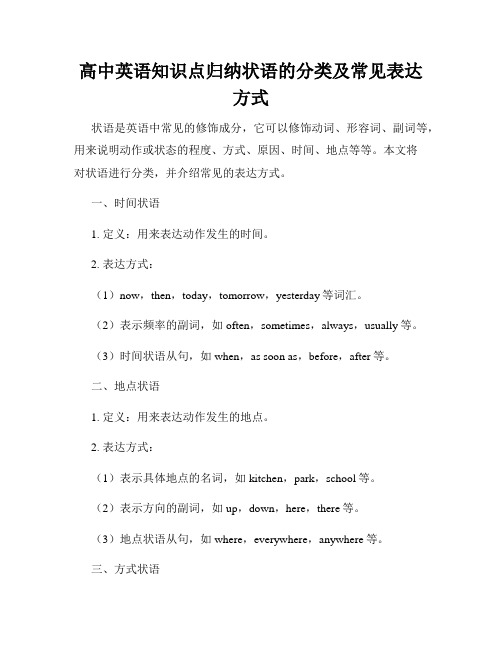
高中英语知识点归纳状语的分类及常见表达方式状语是英语中常见的修饰成分,它可以修饰动词、形容词、副词等,用来说明动作或状态的程度、方式、原因、时间、地点等等。
本文将对状语进行分类,并介绍常见的表达方式。
一、时间状语1. 定义:用来表达动作发生的时间。
2. 表达方式:(1)now,then,today,tomorrow,yesterday等词汇。
(2)表示频率的副词,如often,sometimes,always,usually等。
(3)时间状语从句,如when,as soon as,before,after等。
二、地点状语1. 定义:用来表达动作发生的地点。
2. 表达方式:(1)表示具体地点的名词,如kitchen,park,school等。
(2)表示方向的副词,如up,down,here,there等。
(3)地点状语从句,如where,everywhere,anywhere等。
三、方式状语1. 定义:用来表达动作发生的方式或方法。
2. 表达方式:(1)表示方式的副词,如quickly,carefully,quietly等。
(2)表示方式的介词短语,如by car,on foot等。
(3)方式状语从句,如as if,as though等。
四、程度状语1. 定义:用来表达动作或状态的程度。
2. 表达方式:(1)表示程度的副词,如very,extremely,quite等。
(2)表示程度的介词短语,如to some extent,to a certain degree等。
五、原因状语1. 定义:用来表达动作发生的原因。
2. 表达方式:(1)表示原因的连词,如because,since,as等。
(2)表示原因的副词,如therefore,thus,so等。
(3)原因状语从句,如because of,due to等。
六、条件状语1. 定义:用来表达动作发生的条件。
2. 表达方式:(1)表示条件的连词,如if,unless,whether等。
语法:状语和定语
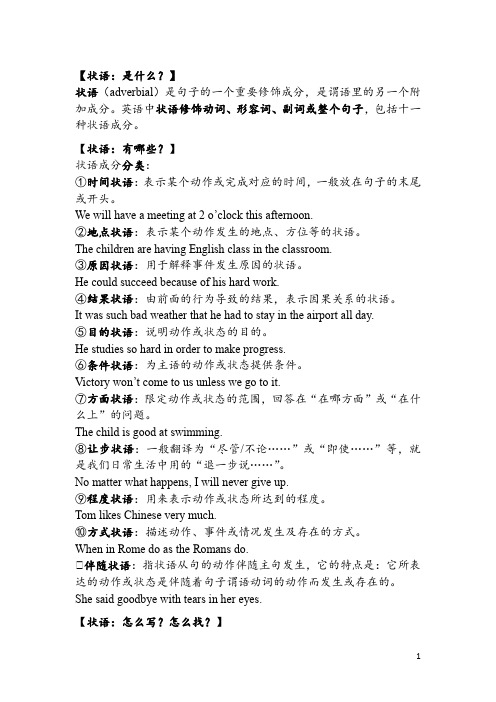
【状语:是什么?】状语(adverbial)是句子的一个重要修饰成分,是谓语里的另一个附加成分。
英语中状语修饰动词、形容词、副词或整个句子,包括十一种状语成分。
【状语:有哪些?】状语成分分类:①时间状语:表示某个动作或完成对应的时间,一般放在句子的末尾或开头。
We will have a meeting at 2 o’clock this afternoon.②地点状语:表示某个动作发生的地点、方位等的状语。
The children are having English class in the classroom.③原因状语:用于解释事件发生原因的状语。
He could succeed because of his hard work.④结果状语:由前面的行为导致的结果,表示因果关系的状语。
It was such bad weather that he had to stay in the airport all day.⑤目的状语:说明动作或状态的目的。
He studies so hard in order to make progress.⑥条件状语:为主语的动作或状态提供条件。
Victory won’t come to us unless we go to it.⑦方面状语:限定动作或状态的范围,回答在“在哪方面”或“在什么上”的问题。
The child is good at swimming.⑧让步状语:一般翻译为“尽管/不论……”或“即使……”等,就是我们日常生活中用的“退一步说……”。
No matter what happens, I will never give up.⑨程度状语:用来表示动作或状态所达到的程度。
Tom likes Chinese very much.⑩方式状语:描述动作、事件或情况发生及存在的方式。
When in Rome do as the Romans do.⑪伴随状语:指状语从句的动作伴随主句发生,它的特点是:它所表达的动作或状态是伴随着句子谓语动词的动作而发生或存在的。
英语词汇语法的句子状语

英语词汇语法的句子状语状语通常由副词,副词短语或介词短语构成。
接下来,小编给大家准备了英语词汇语法的句子状语,欢迎大家参考与借鉴。
英语词汇语法的句子状语1) Adverbials are usually adverbs, adverb phrases, or prepositional phrases.状语通常由副词,副词短语或介词短语构成。
2) Adverbials of manner, place, and time are used to say how, where, or when something happens. 方式状语,地点状语和时间状语用以表示某事发生的方式,地点和时间。
3) Adverbials usually come after the verb, or after the object if there is one. 状语通常置于谓语动词或宾语之后。
4) The usual order of adverbials is manner, then place, then time. 状语通常的顺序是:方式,地点,时间。
语法透析1) An adverbial is often one word, an adverb. 状语经常只是一个副词。
例如:Sit there quietly, and listen to this music. 安静地坐着,听听这音乐。
2) However, an adverbial can also be a group of words: 状语也可能是一组词。
an adverb phrase 副词词组例如:He did not play well enough to win. 他弹得不够好,没能胜出。
a prepositional phrase 介词词组例如:The children were playing in the park. 孩子们在公园玩耍。
英语中状语种类的相关知识讲解
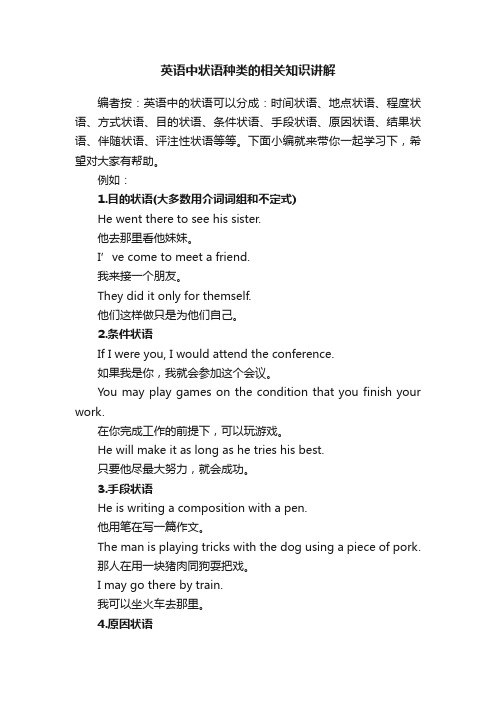
英语中状语种类的相关知识讲解编者按:英语中的状语可以分成:时间状语、地点状语、程度状语、方式状语、目的状语、条件状语、手段状语、原因状语、结果状语、伴随状语、评注性状语等等。
下面小编就来带你一起学习下,希望对大家有帮助。
例如:1.目的状语(大多数用介词词组和不定式)He went there to see his sister.他去那里看他妹妹。
I’ve come to meet a friend.我来接一个朋友。
They did it only for themself.他们这样做只是为他们自己。
2.条件状语If I were you, I would attend the conference.如果我是你,我就会参加这个会议。
You may play games on the condition that you finish your work.在你完成工作的前提下,可以玩游戏。
He will make it as long as he tries his best.只要他尽最大努力,就会成功。
3.手段状语He is writing a composition with a pen.他用笔在写一篇作文。
The man is playing tricks with the dog using a piece of pork.那人在用一块猪肉同狗耍把戏。
I may go there by train.我可以坐火车去那里。
4.原因状语Thank you for your coffee.谢谢你的咖啡。
I’m sorry for forgetting this thing.对不起我忘记这件事情了。
Because it was raining, we put off the party.因为下雨,我们推迟晚会了。
5.结果状语I woke up to find the child lost.我醒来时发现孩子不见了。
英语中状语的分类13种

英语中状语的分类13种1.时间状语(Time adverbial):表示动作发生的时间,如now、yesterday、later等。
2.地点状语(Place adverbial):表示动作发生的地点,如here、there、home等。
3.方式状语(Manner adverbial):表示动作发生的方式,如quickly、slowly、carefully等。
4.原因状语(Cause adverbial):表示动作发生的原因,如because、as、since等。
5.目的状语(Purpose adverbial):表示动作的目的,如in order to、so as to等。
6.结果状语(Result adverbial):表示动作的结果,如so、therefore、thus等。
7.条件状语(Condition adverbial):表示动作发生的条件,如if、unless等。
8.让步状语(Concession adverbial):表示让步、对比或否定,如although、even though、despite等。
9.比较状语(Comparison adverbial):表示比较的程度或方式,如more、less、as等。
10.数量状语(Quantity adverbial):表示数量或程度,如all、enough、much等。
11.程度状语(Degree adverbial):表示程度,如very、almost、hardly等。
12.频率状语(Frequency adverbial):表示动作发生的频率,如always、often、never等。
13.疑问状语(Interrogative adverbial):表示疑问,如when、where、why等。
英语语法之状语及其分类
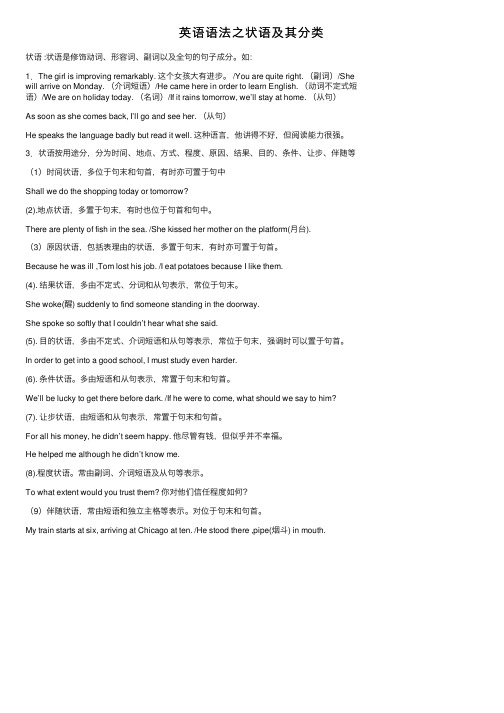
英语语法之状语及其分类状语 :状语是修饰动词、形容词、副词以及全句的句⼦成分。
如:1.The girl is improving remarkably. 这个⼥孩⼤有进步。
/You are quite right. (副词)/She will arrive on Monday. (介词短语)/He came here in order to learn English. (动词不定式短语)/We are on holiday today. (名词)/If it rains tomorrow, we’ll stay at home. (从句)As soon as she comes back, I’ll go and see her. (从句)He speaks the language badly but read it well. 这种语⾔,他讲得不好,但阅读能⼒很强。
3.状语按⽤途分,分为时间、地点、⽅式、程度、原因、结果、⽬的、条件、让步、伴随等(1)时间状语,多位于句末和句⾸,有时亦可置于句中Shall we do the shopping today or tomorrow?(2).地点状语,多置于句末,有时也位于句⾸和句中。
There are plenty of fish in the sea. /She kissed her mother on the platform(⽉台).(3)原因状语,包括表理由的状语,多置于句末,有时亦可置于句⾸。
Because he was ill ,Tom lost his job. /I eat potatoes because I like them.(4). 结果状语,多由不定式、分词和从句表⽰,常位于句末。
She woke(醒) suddenly to find someone standing in the doorway.She spoke so softly that I couldn’t hear what she said.(5). ⽬的状语,多由不定式、介词短语和从句等表⽰,常位于句末,强调时可以置于句⾸。
现代英语语法学习笔记-第十三章-状语-Adverbials

第十三章状语Adverbials13.0 Introduction1. 形式:状语可以是副词形容词名词,介词词组,副词词组,形容词&名词词组,分句等。
2. 位置:可在句首,句中和句末。
3. 语法结构:1)结合性状语(integrated)。
2)分离性状语(peripheral)。
判断方法:把整句带入:“It’s true that…“里可以明显看出。
slowly.-- i t’s true that John drove slowly. (integrated,adjuncts )Fortunately, he came back just in time.--Fortunately,It’s true that he came back just in time. (Peripheral, disjuncts )However, it was a good meeting.-- However, it’s true that it was a good meeting. (Peripheral, conjuncts)* Adjuncts: 修饰性状语,主要修饰动词* Disjuncts: 评注性状语,对分句内容的评价。
* Conjuncts: 连接性状语,逻辑粘合剂,把新句子加入文章中。
Adjuncts修饰性状语Adverbials 状语Disjuncts: 评注性状语Peripheral adverbial (分离性状语)Conjuncts: 连接性状语13.1 Adjuncts 修饰性状语分时间状语(Time Adjuncts),地点状语(Place Adjuncts),过程状语(Process Adjuncts),因果状语(Contingency Adjuncts)。
13.1.1时间状语Time Adjuncts13.1.2地点状语Place Adjuncts13.1.3过程状语Process AdjunctsHe told me in personat the meetingyesterday. (Process + Place + Time) 13.1.4因果状语Contingency Adjuncts。
现在分词作状语的分类(伴随、让步、条件、时间等等)
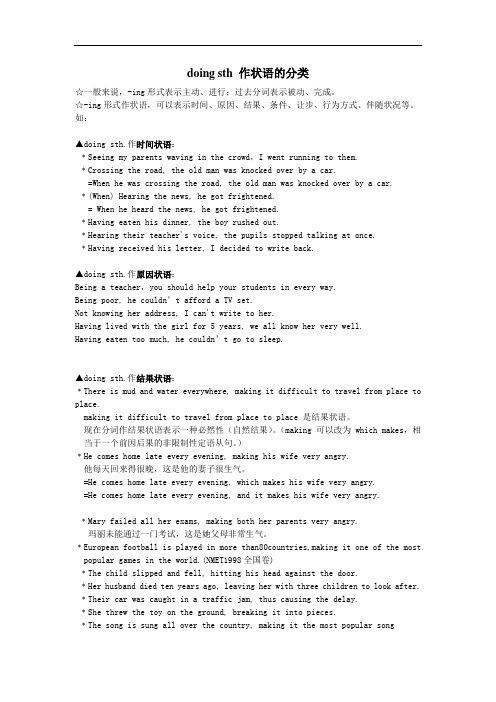
doing sth 作状语的分类☆一般来说,-ing形式表示主动、进行;过去分词表示被动、完成。
☆-ing形式作状语,可以表示时间、原因、结果、条件、让步、行为方式、伴随状况等。
如:▲doing sth.作时间状语:﹡Seeing my parents waving in the crowd,I went running to them.﹡Crossing the road, the old man was knocked over by a car.=When he was crossing the road, the old man was knocked over by a car.﹡(When) Hearing the news, he got frightened.= When he heard the news, he got frightened.﹡Having eaten his dinner, the boy rushed out.﹡Hearing their teacher's voice, the pupils stopped talking at once.﹡Having received his letter, I decided to write back.▲doing sth.作原因状语:Being a teacher,you should help your students in every way.Being poor, he couldn’t afford a TV set.Not knowing her address, I can't write to her.Having lived with the girl for 5 years, we all know her very well.Having eaten too much, he couldn’t go to sleep.▲doing sth.作结果状语:﹡There is mud and water everywhere, making it difficult to travel from place to place.making it difficult to travel from place to place 是结果状语。
高考英语语法 状语

3.原因状语从句 一般由because, since, as, now that等引导. I don’t drink beer, because I have to drive home after the party. Wear strong shoes as we shall do a lot of walking. Why do people come to his lecture since he is difficult to understand? Now that they could ride horses, it became easier to hunt the bison.
(2) 表示时间的名词修饰其后的 ago, since, before, after, week, month等词时。 I saw him two weeks ago. 我在两周前见过他。 Many years later, he became a millionaire. 很多年过去了,他成了百万富翁。 (3) 名词或名词词组前的during或 for省略之后,名词就直接作了状语。 Could you wait (for) a few days for the money? 这钱,你们可以等几天吗? Nothing happened (during) the whole vacation. 整个假期,什么事也没发生。
高中英语知识点归纳状语的分类及用法

高中英语知识点归纳状语的分类及用法英语中的状语(Adverbial)是表示动作、情态、时间、地点、方式、原因、目的等的修饰成分,状语可通过不同的形式来表达,如副词、介词短语、从句等。
下面是高中英语知识点归纳状语的分类及用法的详细内容。
一、时间状语(Adverbial of Time)描述动作发生的具体时间或时间段。
1. 副词形式的时间状语:今天(today)、明天(tomorrow)、昨天(yesterday)、现在(now)、过去(past)、将来(future)等。
例如:He will travel to Japan next week.翻译:他下个星期会去日本旅行。
2. 介词短语形式的时间状语:at(在……时刻)、on(在……日子)、in(在……时间段)等。
例如:She usually goes to the gym in the evening.翻译:她通常晚上去健身房。
3. 从句形式的时间状语:when(当……时候)、while(当……时候)、before(在……之前)、after(在……之后)等。
例如:I will call you when I arrive.翻译:我到达时会给你打电话。
二、地点状语(Adverbial of Place)描述动作发生的具体地点或场所。
1. 副词形式的地点状语:here(这里)、there(那里)、everywhere(到处)、somewhere (某处)等。
例如:The cat is hiding under the table.翻译:猫躲在桌子下面。
2. 介词短语形式的地点状语:in(在……里)、on(在……上)、at(在……处)等。
例如:The book is on the shelf.翻译:这本书在书架上。
3. 从句形式的地点状语:where(在哪里)、wherever(无论在哪里)等。
例如:Please tell me where you live.翻译:请告诉我你住在哪里。
英语语法中状语的3个基本位置讲解

英语语法中状语的3个基本位置讲解编者按:状语有句首状语、句中状语、句尾状语,在句中位于这三个主要位置,介这三个位置状语的作用有所不同。
下面小编就来带你一起学习下状语的3个基本位置,希望对大家有帮助。
1.状语的3个基本位置状语+主语+状语+谓语+宾语+宾补+状语句首状语句中状语句尾状语Now Robert really likes others to call Robbie at school.如今杰克在学校里真喜欢别人叫他罗比。
状语在句中位于这三个主要位置,介这三个位置状语的作用有所不同:1)句首状语绝大多数与句尾状语相同,往往可以交换位置。
不过,大多数状语习惯上都放在句尾,因此,句尾状语是学习的重点。
2)句中状语一般只表示“频率、否定、程度”三种内容,且是单个副词,很少用副词词组。
句中状语在现在一般时、过去一般时这类没有助动词的情况下,放在主语和谓语之间:We often go on the Internet.我们经常上网。
They usually took a bus to school.他们(过去)通常乘巴士上学。
当为第一个动词是助动词(或者情态动词)时,句中状语则要放在助动词后面:He will surely come this afternoon.他今天下午肯定会来。
We have never seen such an animal before.我们从未见过这种动物。
She could hardlybelieve it.她很难想念这件事。
用作句中状语的副词常见的只有30多个:频率:seldom, often, always, usually,constantly, normally, ever, regularly, continually, repeatedly否定:not, never, hardly, barely, rarely,scarcely程度:quite, well, completely, rather,entirely greatly, really, almost, only, even, merely, simply, probably,possibly, badly 要领:在汉译英、说、写英语时,汉语的句中状语只有在与英语的句中状语相同时保留原位,其余绝大多数状语统统往后移作英语的句尾状语。
英语状语的分类

英语状语的分类英语中的状语按其用途,可以分为时间状语、地点状语、原因状语、结果状语、目的状语、条件状语、让步状语、比较状语、方式状语等9种。
1、时间状语常用引导词:when,as,while,before,after,since,not...until,until/till 等特殊引导词:the minute, the moment, the second, every time, the day,the instant(瞬间,顷刻), immediately , directly, no sooner … than, hardly …when , scarcely … when(刚...就.../一...就...),as soon as(一…就…)。
I didn’t realize how special my mother was until I became an adult.直到我成为了一个成年人我才意识到我的母亲是多么的特殊。
2、地点状语常用引导词:where特殊引导词:wherever, anywhere, everywhereGenerally, air will be heavily polluted where there are factories.一般来说,有工厂的地方空气污染就严重。
3、原因状语常用引导词:because, since, as,特殊引导词:seeing that, now that, in that, considering that, given that.My friends dislike me because I’m handsome and successful.我的朋友都不喜欢我,因为我又英俊又成功。
常用引导词:if, unless,whether(whether...or not)特殊引导词:as/so long as, only if, providing/provided that, supposing that, in case (美语中表条件,英语中表目的), on condition thatWe’ll start our project if the president agrees.如果总统同意,我们将开始我们的项目。
英语中的状语解析

The end
thanks
He went to school yesterday though he was ill.
昨天他尽管有病,仍上学去了。
10.比较状语:
Lesson Two is not so difficult as Lesson One.
第二课不像第一课那样难。
四、状语的位置:
一般说来状语在句中的位置比较灵活,它可 以处于句首、句中或句末。
She studies hard.
她努力学习。
I am very tired.
我非常疲倦。
二、什么可以作状语?
1.副词:
Say again.再说一遍。 Suddenly it began to rain.天突然下雨了。
2.介词短语:
Please come here in the evening.
1.状语位于句首:为了强调状语或者为了 使它与上下文紧密衔接,通常把状语放于句 首。
Tomorrow I am going swimming.
明天我要去游泳。
Here in the cinema house,smoking is not allowed.
在电影院这里不准吸烟的。
2.状语位于句中:状语在句中的位置是:
它能整日整夜地走。
6.状语从句:
I’ll write to you as soon as I get there.
我一到那儿就给你写信。
He didn’t come because he had to stay at home to finish his home work.
他没来,因为他不得不留在家里完成家庭作业。
英语状语有哪些种类,英语状语的分类

英语状语有哪些种类,英语状语的分类(最新版)编制人:__________________审核人:__________________审批人:__________________编制单位:__________________编制时间:____年____月____日序言下载提示:该文档是本店铺精心编制而成的,希望大家下载后,能够帮助大家解决实际问题。
文档下载后可定制修改,请根据实际需要进行调整和使用,谢谢!并且,本店铺为大家提供各种类型的经典范文,如词性大全、句法大全、句型大全、从句大全、时态大全、语态大全、语法大全、虚拟语气、用法辨析、其他资料等等,想了解不同范文格式和写法,敬请关注!Download tips: This document is carefully compiled by this editor.I hope that after you download it, it can help you solve practical problems. The document can be customized and modified after downloading, please adjust and use it according to actual needs, thank you!In addition, this shop provides you with various types of classic sample essays, such as part of speech, syntax, sentence pattern, clause, tense, voice, grammar, subjunctive, usage analysis, other materials, etc. If you want to know the different formats and writing methods of the model essay, please pay attention!英语状语有哪些种类,英语状语的分类英语中的状语按其用途,可以分为时间状语、地点状语、方面状语、原因状语、结果状语、目的状语、条件状语、让步状语、程度状语、方式状语、伴随状语等11种。
英语状语

英语状语英语中,修饰动词、形容词、副词等的句子成分叫状语(adverbial)。
状语的功用:状语说明地点、时间、原因、目的、结果、条件、方向、程度、方式和伴随状况等。
状语一般由副词、介词短语、分词和分词短语、不定式或相当于副词的词或短语来担当。
其位置一般放在句末,但也可放在句首或句中。
副词是一种用来修饰动词,形容词,副词或全句的词,说明时间,地点,程度,方式等概念。
1.副词一般在句子中做状语.He speaks English very well. 他英语说得非常好.中的very是程度状语,用来修饰well。
He is playing under the tree.他在树下玩儿.中的under the tree是地点状语.2. 不定式在句子中可以作目的状语。
I come specially to see you.我专门来看你.3.介词短语Ten years ago, She began to live in Dalian.The boy was praised for his bravery.4.从句作状语When she was 12 years old, she began to live in Dalian.If I am not busy tomorrow, I will play football with you.5.分词作状语Having had a quarrel with his wife, he left home in a bad temper。
Inhibited in one direction, it now seems that the Mississippi is about to take another.什么是状语1状语是谓语里的另一个附加成分,它附加在谓语中心语的前面,从情况,时间,处所,方式,条件,对象,肯定,否定,范围和程度等方面对谓语中心进行修饰或限制.状语与定语相同的地方是,都是前加附加成分;不同的地方是,它是谓语里的附加成分,而定语是主语或宾语里的附加成分.从句子的层次上看,状语是在第二个层次和第三个层次里的成分,有时甚至是更低层次的成分.2状语的构成状语的构成经常充当状语的有形容词,副词,时间处所名词,能愿动词,指示代词,以及方位短语,介词短语,动宾短语,谓词性联合短语,谓词性偏正短语,谓词性主谓短语等.含有动量词的数量短语以及重叠式的数量短语(不论动量,物量)也可以充当状语.此外,少数名词带上表比况的助词也可以作状语.3状语的书面标志——"地"状语的书面标志是结构助词"地".状语后面带或者是不带"地",情况比较复杂.一般讲来,数量短语,主谓短语,动宾短语等作状语时,大都带"地";而介词短语,方位短语,能愿动词,时间处所名词作状语时不能带"地",副词,单音节形容词作状语一般也不带"地".4多层状语如果一个中心语前面有好几个状语(多层状语),那就应当注意它们的语序.多层状语的状语个数一般比多层定语的定语个数要少些,其语序也比多层定语的语序要灵活一些.多层状语的一般语序:a.表时间的名词或方位短语,介词短语;b.副词.c.表处所的介词短语或名词,方位短语;d.表情态的形容词或谓词短语;e.表对象的介词短语.其中副词的位置较为灵活,也可放置在第三项之后.5一般状语和句首状语状语在句子中有两种位置:一种是在主语之后,谓语中心之前,如上文所举各例,这是状语的一般位置;另一种是放在主语的前面的,这是状语的特殊位置,这种状语可称"句首状语".6状语的分类状语按其修饰的功能不同可分为八大类:时间状语,条件状语,原因状语,目的状语,结果状语,让步状语和比较状语时间状语从句要点: 时间状语从句,由以下连词引导:when ,while,as,after ,before,as soon as,since ,till /until by the time 在时间状语从句中,要注意时态一致。
- 1、下载文档前请自行甄别文档内容的完整性,平台不提供额外的编辑、内容补充、找答案等附加服务。
- 2、"仅部分预览"的文档,不可在线预览部分如存在完整性等问题,可反馈申请退款(可完整预览的文档不适用该条件!)。
- 3、如文档侵犯您的权益,请联系客服反馈,我们会尽快为您处理(人工客服工作时间:9:00-18:30)。
第十三章状语Adverbials
13.0 Introduction
1. 形式:状语可以是副词形容词名词,介词词组,副词词组,形容词&名词词组,分句等。
2. 位置:可在句首,句中和句末。
3. 语法结构:1)结合性状语(integrated)。
2)分离性状语(peripheral)。
判断方法:把整句带入:“It’s true that…“里可以明显看出。
E.g.: John drove slowly.
-- i t’s true that John drove slowly. (integrated,adjuncts )
Fortunately, he came back just in time.
--Fortunately, It’s true that he came back just in time. (Peripheral, disjuncts )
However, it was a good meeting.
-- However, it’s true that it was a good meeting. (Peripheral, conjuncts)
* Adjuncts: 修饰性状语,主要修饰动词
* Disjuncts: 评注性状语,对分句内容的评价。
* Conjuncts: 连接性状语,逻辑粘合剂,把新句子加入文章中。
Integrated adverbial(结合性状语)Adjuncts修饰性状语
Adverbials 状语Disjuncts: 评注性状语
Peripheral adverbial (分离性状语)
Conjuncts: 连接性状语
13.1 Adjuncts 修饰性状语
分时间状语(Time Adjuncts),地点状语(Place Adjuncts),过程状语(Process Adjuncts),因果状语(Contingency Adjuncts)。
13.1.1时间状语Time Adjuncts
13.1.2地点状语Place Adjuncts
13.1.3过程状语Process Adjuncts
a. Types of Process Adjuncts
Manner Adjuncts (方式状语) Instruments Adjuncts(工具状语) Agentive Adjuncts(执行者状语)
⏹Manner Adjuncts 方式状语
1.Definition:描述事情如何完成的状语。
They plan the project carefully.
2.可被How, In what way/manner 来提问。
How do they plan the project?
3.一般用副词来当方式状语,其他方式显得比较繁琐。
⏹Instruments Adjuncts工具状语
1.方式状语指某事如何完成的,主观描述,而工具状语则指在外部帮助下某事如何完成,很客观。
Why not cut the bread with a knife?
I used to go to work by bike.
You can start the machine by pressing the button.
2.最常见的形式是with + 方式
Agentive Adjuncts(执行者状语)
1.指执行动作的人,by + performer, 特别会出现在被动语态中,执行者一般是人,或者把物体拟人化。
The flying object was seen by many people.
The work can be easily done by a machine.
当过程状语,时间状语,地点状语同时出现时,按以下规律排列:
Process + Place + Time
He told me in person at the meeting yesterday. (Process + Place + Time)
13.1.4因果状语Contingency Adjuncts
Reason Adjunct(原因状语) Result Adjunct(结果状语) Purpose Adjunct(目的状语) Concession Adjunct(让步状语) Condition Adjunct(条件状语)
⏹Reason Adjunct(原因状语)
1.当想表示事物或某一行为的原因时,用原因状语从句
2.一般以because引导从句,或者since,as,for…
I asked her to stay, for I have something important to tell her.
Because of his bad leg, he couldn’t walk as fast as others.
3.也可出现在不定从句中,省略连接词。
Being unable to concentrate at home, he went to the library.
Situated at the foot of the mountain, the village was very quiet.
4.As结构的的原因状语从句。
Foolish as he was, he would defy any advice and continue to make the same mistakes.。
